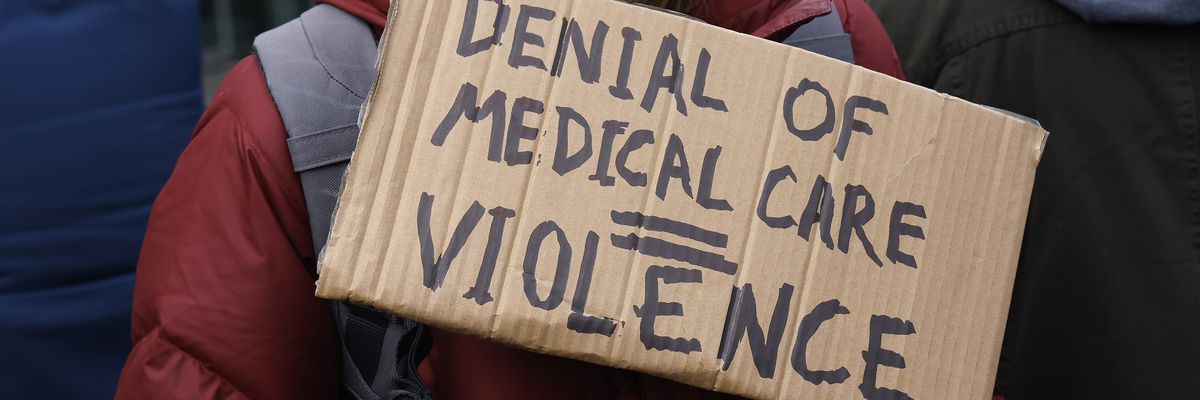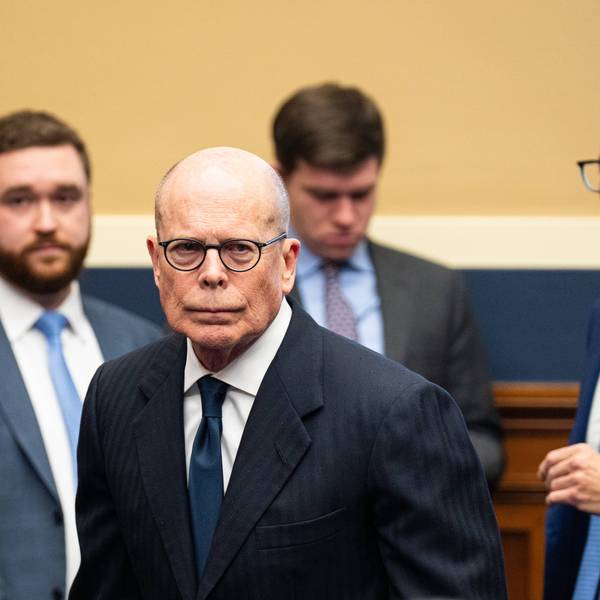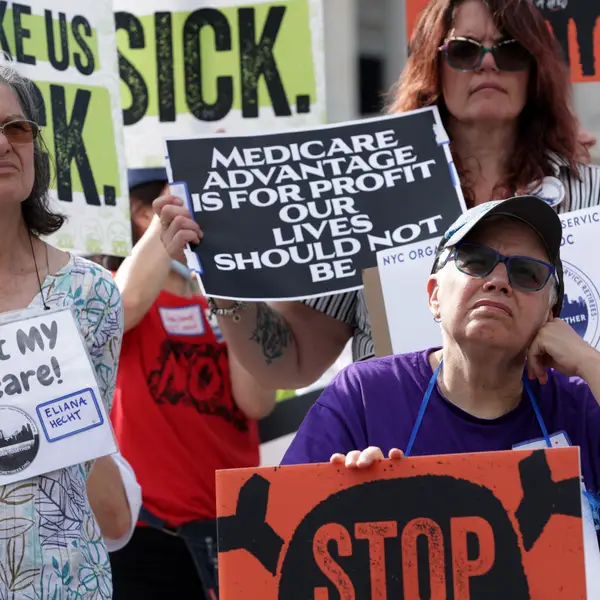
A person demonstrating against the healthcare industry holds a sign on December 19, 2024 in New York City.
'Out of Control': Insurance Giant UnitedHealth Calls in Middle of Cancer Surgery to Question Necessity
Dr. Elisabeth Potter shared "another horror story from a doctor dealing with United Healthcare's terrible authorization process."
A month after the killing of UnitedHealthcare CEO Brian Thompson prompted many Americans to share personal horror stories of the company's coverage denials and other practices, a doctor in Austin, Texas on Wednesday shared her own experience that she said exemplified how the for-profit health system "just keeps getting worse."
In a video posted to TikTok, Dr. Elisabeth Potter said she recently received an unprecedented phone call from UnitedHealthcare about a patient—one who was already under anesthesia and having surgery.
Potter, a plastic surgeon who specializes in reconstructive surgery for breast cancer patients who have had mastectomies, said she was performing a bilateral deep inferior epigastric perforator [DIEP} surgery when UnitedHealthcare called her in the operating room.
The call was urgent, she was told, and needed to be returned right away.
"So I scrubbed out of my case and I called UnitedHealthcare, and the gentleman said he needed some information about her," said Potter. "Wanted to know her diagnosis and whether her inpatient stay should be justified."
Potter found that the person calling wasn't aware that the patient whose care he was questioning had breast cancer and was in the operating room—that information was known by "a different department" at UnitedHealthcare.
Potter's account, said Nidhi Hegde, managing director at the American Economic Liberties Project, was "another horror story from a doctor dealing with United Healthcare's terrible authorization process."
"Ridiculous that doctors/nurses are spending time explaining their work to an insurance company instead of being able to focus on care," said Hegde.
As Common Dreams reported last month, cancer patients have become disproportionately affected by "prior authorizations" demanded by for-profit health insurers, which require doctors to get approval for treatments. Prior authorization can delay lifesaving care and one survey of oncologists in 2022 found that patients experienced "disease progression" 80% of the time an insurance company's bureaucratic requirements delayed their treatment.
Potter had to inform the UnitedHealthcare staffer that the company had already given her approval for the surgery.
She said she told him, "I need to go back and be with my patient now" and was able to continue the procedure.
"But it's out of control," she said. "Insurance is out of control. I have no other words."
Even before Thompson's killing, UnitedHealthcare has garnered outrage for the numerous methods it uses to deny healthcare coverage to patients.
A Senate investigation found the company intentionally denied claims submitted by nursing home patients who suffered strokes and falls, in order to increase profits. The company also faces a class-action lawsuit for using an AI algorithm with a 90% error rate to deny coverage to senior citizens with Medicare Advantage plans,
In December, ProPublica published an investigation that found the company is one of several insurers who repeatedly relied on the advice of company doctors who have wrongly recommended denying care.
In a follow-up video, Potter said on Wednesday that insurance companies have created "a fear-based system where, if an insurance company calls me and says I've got to call them right back, I'm afraid they're not going to pay for my patient's surgery, that patient is going to get stuck with a bill."
Potter told Newsweek that the experience confirmed for her that "there is no room in healthcare where the pressure of insurance isn't felt by both patients and doctors. Not even the operating room."
UnitedHealthcare suggested in a comment to Newsweek that it did not call Potter during surgery, saying, "There are no insurance related circumstances that would require a physician to step out of surgery and it would create potential safety risks if they were to do so. We did not ask nor would ever expect a physician to interrupt patient care to answer a call and we will be following up with the provider and hospital to understand why these unorthodox actions were taken."
Potter joined many Americans in speaking out against the for-profit health insurance system in the days after Thompson's killing, offering a doctor's perspective.
"I want you to know that insurance companies are affecting the kind of care that you're getting, because they're applying pressures to physicians through their policymaking," said Potter in one video posted on TikTok. "This is a dark, dark time for healthcare, and we have to fix this or we're gonna go down a path that we can't get back from."
An Urgent Message From Our Co-Founder
Dear Common Dreams reader, The U.S. is on a fast track to authoritarianism like nothing I've ever seen. Meanwhile, corporate news outlets are utterly capitulating to Trump, twisting their coverage to avoid drawing his ire while lining up to stuff cash in his pockets. That's why I believe that Common Dreams is doing the best and most consequential reporting that we've ever done. Our small but mighty team is a progressive reporting powerhouse, covering the news every day that the corporate media never will. Our mission has always been simple: To inform. To inspire. And to ignite change for the common good. Now here's the key piece that I want all our readers to understand: None of this would be possible without your financial support. That's not just some fundraising cliche. It's the absolute and literal truth. We don't accept corporate advertising and never will. We don't have a paywall because we don't think people should be blocked from critical news based on their ability to pay. Everything we do is funded by the donations of readers like you. Will you donate now to help power the nonprofit, independent reporting of Common Dreams? Thank you for being a vital member of our community. Together, we can keep independent journalism alive when it’s needed most. - Craig Brown, Co-founder |
A month after the killing of UnitedHealthcare CEO Brian Thompson prompted many Americans to share personal horror stories of the company's coverage denials and other practices, a doctor in Austin, Texas on Wednesday shared her own experience that she said exemplified how the for-profit health system "just keeps getting worse."
In a video posted to TikTok, Dr. Elisabeth Potter said she recently received an unprecedented phone call from UnitedHealthcare about a patient—one who was already under anesthesia and having surgery.
Potter, a plastic surgeon who specializes in reconstructive surgery for breast cancer patients who have had mastectomies, said she was performing a bilateral deep inferior epigastric perforator [DIEP} surgery when UnitedHealthcare called her in the operating room.
The call was urgent, she was told, and needed to be returned right away.
"So I scrubbed out of my case and I called UnitedHealthcare, and the gentleman said he needed some information about her," said Potter. "Wanted to know her diagnosis and whether her inpatient stay should be justified."
Potter found that the person calling wasn't aware that the patient whose care he was questioning had breast cancer and was in the operating room—that information was known by "a different department" at UnitedHealthcare.
Potter's account, said Nidhi Hegde, managing director at the American Economic Liberties Project, was "another horror story from a doctor dealing with United Healthcare's terrible authorization process."
"Ridiculous that doctors/nurses are spending time explaining their work to an insurance company instead of being able to focus on care," said Hegde.
As Common Dreams reported last month, cancer patients have become disproportionately affected by "prior authorizations" demanded by for-profit health insurers, which require doctors to get approval for treatments. Prior authorization can delay lifesaving care and one survey of oncologists in 2022 found that patients experienced "disease progression" 80% of the time an insurance company's bureaucratic requirements delayed their treatment.
Potter had to inform the UnitedHealthcare staffer that the company had already given her approval for the surgery.
She said she told him, "I need to go back and be with my patient now" and was able to continue the procedure.
"But it's out of control," she said. "Insurance is out of control. I have no other words."
Even before Thompson's killing, UnitedHealthcare has garnered outrage for the numerous methods it uses to deny healthcare coverage to patients.
A Senate investigation found the company intentionally denied claims submitted by nursing home patients who suffered strokes and falls, in order to increase profits. The company also faces a class-action lawsuit for using an AI algorithm with a 90% error rate to deny coverage to senior citizens with Medicare Advantage plans,
In December, ProPublica published an investigation that found the company is one of several insurers who repeatedly relied on the advice of company doctors who have wrongly recommended denying care.
In a follow-up video, Potter said on Wednesday that insurance companies have created "a fear-based system where, if an insurance company calls me and says I've got to call them right back, I'm afraid they're not going to pay for my patient's surgery, that patient is going to get stuck with a bill."
Potter told Newsweek that the experience confirmed for her that "there is no room in healthcare where the pressure of insurance isn't felt by both patients and doctors. Not even the operating room."
UnitedHealthcare suggested in a comment to Newsweek that it did not call Potter during surgery, saying, "There are no insurance related circumstances that would require a physician to step out of surgery and it would create potential safety risks if they were to do so. We did not ask nor would ever expect a physician to interrupt patient care to answer a call and we will be following up with the provider and hospital to understand why these unorthodox actions were taken."
Potter joined many Americans in speaking out against the for-profit health insurance system in the days after Thompson's killing, offering a doctor's perspective.
"I want you to know that insurance companies are affecting the kind of care that you're getting, because they're applying pressures to physicians through their policymaking," said Potter in one video posted on TikTok. "This is a dark, dark time for healthcare, and we have to fix this or we're gonna go down a path that we can't get back from."
A month after the killing of UnitedHealthcare CEO Brian Thompson prompted many Americans to share personal horror stories of the company's coverage denials and other practices, a doctor in Austin, Texas on Wednesday shared her own experience that she said exemplified how the for-profit health system "just keeps getting worse."
In a video posted to TikTok, Dr. Elisabeth Potter said she recently received an unprecedented phone call from UnitedHealthcare about a patient—one who was already under anesthesia and having surgery.
Potter, a plastic surgeon who specializes in reconstructive surgery for breast cancer patients who have had mastectomies, said she was performing a bilateral deep inferior epigastric perforator [DIEP} surgery when UnitedHealthcare called her in the operating room.
The call was urgent, she was told, and needed to be returned right away.
"So I scrubbed out of my case and I called UnitedHealthcare, and the gentleman said he needed some information about her," said Potter. "Wanted to know her diagnosis and whether her inpatient stay should be justified."
Potter found that the person calling wasn't aware that the patient whose care he was questioning had breast cancer and was in the operating room—that information was known by "a different department" at UnitedHealthcare.
Potter's account, said Nidhi Hegde, managing director at the American Economic Liberties Project, was "another horror story from a doctor dealing with United Healthcare's terrible authorization process."
"Ridiculous that doctors/nurses are spending time explaining their work to an insurance company instead of being able to focus on care," said Hegde.
As Common Dreams reported last month, cancer patients have become disproportionately affected by "prior authorizations" demanded by for-profit health insurers, which require doctors to get approval for treatments. Prior authorization can delay lifesaving care and one survey of oncologists in 2022 found that patients experienced "disease progression" 80% of the time an insurance company's bureaucratic requirements delayed their treatment.
Potter had to inform the UnitedHealthcare staffer that the company had already given her approval for the surgery.
She said she told him, "I need to go back and be with my patient now" and was able to continue the procedure.
"But it's out of control," she said. "Insurance is out of control. I have no other words."
Even before Thompson's killing, UnitedHealthcare has garnered outrage for the numerous methods it uses to deny healthcare coverage to patients.
A Senate investigation found the company intentionally denied claims submitted by nursing home patients who suffered strokes and falls, in order to increase profits. The company also faces a class-action lawsuit for using an AI algorithm with a 90% error rate to deny coverage to senior citizens with Medicare Advantage plans,
In December, ProPublica published an investigation that found the company is one of several insurers who repeatedly relied on the advice of company doctors who have wrongly recommended denying care.
In a follow-up video, Potter said on Wednesday that insurance companies have created "a fear-based system where, if an insurance company calls me and says I've got to call them right back, I'm afraid they're not going to pay for my patient's surgery, that patient is going to get stuck with a bill."
Potter told Newsweek that the experience confirmed for her that "there is no room in healthcare where the pressure of insurance isn't felt by both patients and doctors. Not even the operating room."
UnitedHealthcare suggested in a comment to Newsweek that it did not call Potter during surgery, saying, "There are no insurance related circumstances that would require a physician to step out of surgery and it would create potential safety risks if they were to do so. We did not ask nor would ever expect a physician to interrupt patient care to answer a call and we will be following up with the provider and hospital to understand why these unorthodox actions were taken."
Potter joined many Americans in speaking out against the for-profit health insurance system in the days after Thompson's killing, offering a doctor's perspective.
"I want you to know that insurance companies are affecting the kind of care that you're getting, because they're applying pressures to physicians through their policymaking," said Potter in one video posted on TikTok. "This is a dark, dark time for healthcare, and we have to fix this or we're gonna go down a path that we can't get back from."

